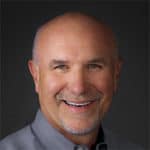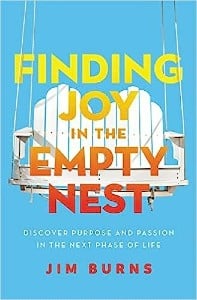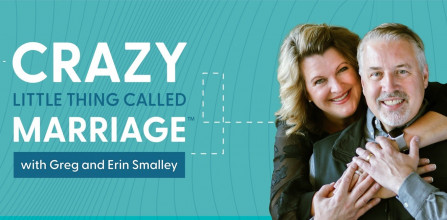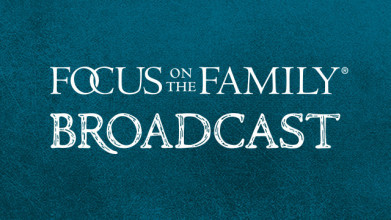Dr. Jim Burns: You know what I found in the empty nest, when my kids started, you know, moving out here, is that it did get more quiet, and I didn’t have as much responsibility.
Jim: (laughs) Right.
Dr. Burns: And so I could actually say, slowly, what could I do here? But what’s excessive that I was doing a lot with our kids, and now I don’t have to do as much?
John Fuller: That’s Jim Burns, talking about, uh, the phase of life that we call empty nesting. Joys and challenges abound. Uh, Jim is with us again on Focus on the Family, and we’re so glad you’ve joined us. I’m John Fuller. And your host is Focus president, and author, Jim Daly.
Jim Daly: Well, it’s great to have Jim back, we did have a, a wonderful discussion last time. And r- really, it flew by. You always know that it’s going well, when you look up and the time’s gone.
John: Yeah.
Jim: So if you missed last time, certainly, uh, you know, find a way through the website or the smartphone download to get the app. And you can hear not only yesterday’s program, but the whole library of programs. Um, we did talk about the pain and the, uh, emotional experience of that, uh, empty nest beginning. And John, you talked about how you’re in that phase now.
John: We are.
Jim: And I’m halfway there, Trent’s out. Troy’s still at the house. But, uh, and I love that actually, (laughs) I mean, I’m still, uh, lingering in that space where I know Troy’s there, we can have dinner together and, and have good chitchats together. But that day is soon, when he’ll be gone. And wow, it’s, it’s gonna be a different household. So this is really good stuff, it’s actually a therapy session for me. (laughs) So you can listen in. But, uh, I’m looking forward to coming back to more content.
John: Yeah. And Jim is, uh, the president of HomeWord, uh, they seek to help families thrive, uh, very similar value alignment for us here with Jim and, and HomeWord. Uh, he and his wife Cathy have three girls who have all left the nest. And, uh, I love the passion and the heart and stories he has to share. He’s captured so much of, of this kind of a season of life in the book Finding Joy in the Empty Nest: Discover Purpose and Passion in the Next Phase of Life. And we’ve got copies of that book here at the ministry, stop by focusonthefamily.com/broadcast. Or call us. 800, the letter A, and the word FAMILY.
Jim: Jim, great to have you back.
Dr. Burns: So good to be with you, so good.
Jim: Keeping this going, you’re helping me immensely (laughs). You know, one of the things I didn’t get to last time and I wanted to, so I’ll kick it off here, uh, you mentioned, you know, taking small steps in the right direction, that’s great life advice, no matter what your age or stage.
Dr. Burns: Sure.
Jim: But in this case, you created an acronym called SEE YA. And I thought it was great. Again, you know, parents with young kids could benefit from this same acronym.
Dr. Burns: Sure, yeah.
Jim: But what is SEE YA, what does it stand for?
Dr. Burns: Well, uh, it stands for something that’s important in the empty nest that we have to declutter. And here, we get a chance to declutter it. Now, again, if we’re-
Jim: Even the garage?
Dr. Burns: Even the garage.
Jim: (laughs).
Dr. Burns: Now, this is what you think of, when you think of declutter, you think of garage. Right now, Cathy has me on a, a T-shirt restriction. She said I have three drawers of T-shirts. And I have a certain date, and I need to go to two. And I’m going, they have holes but they’re meaningful to me.
Jim: I’ve got, like, 30 In-N-Out burger T-shirts (laughs).
Dr. Burns: Okay, see, we’ll, your-
Jim: My mother-in-law gave them to me at Christmas, (laughs) like three or four at a time.
Dr. Burns: You’re gonna have to declutter, Jim. But I think it’s the perfect time to declutter. Because again, when you, when you move to the empty nest, you, you have different directions. You have, uh, uh, you, you have some things that you’ve just been holding onto, and it’s time to let it go. So I call it, you know, SEE YA. And, and first of all, the S stands for, what sucks your energy? And, you know, there are things that just suck my energy that I don’t have to do. You know, Peter Drucker, the great management guru, but he says, “First things first, last things, not at all.” And so there’s some things that, that were last things in my life. I wish I could say I’ve done this really well, but my garage is in deep need, and my wife reminds me of that. But when it comes to other things, even personal life, what’s sucking your energy? And do you still need to be doing that? I know somebody who went off of two boards. And, you know, I’m, I’m sad for the board people, but he said, “Do you know what? I’m going off of these two boards, ’cause my interest is now in doing missions work in Nepal.” This is a, a layperson.
Jim: Wow.
Dr. Burns: And he said, “And I’m gonna put my energy into that.”
Jim: Yeah.
Dr. Burns: Well, good for him. He, he decluttered some things, it was time for somebody else. The other is what’s just excessive in your life? Are there some things, you know, in the SEE YA, uh, model, are there some things that are just, you know, excessive? Are you, are you doing too much of this, are you doing too much of that? You know, what I found in the empty nest, when my kids started, you know, moving out here, is that it did get more quiet. And I didn’t have as much responsibility.
Jim: (laughs) Right.
Dr. Burns: And so I could actually say, slowly, what could I do here? But what’s excessive that I was doing a lot with our kids, and now I don’t have to do as much? Uh-
Jim: You know, let me, let me give you an example, uh, I think that fits here.
Dr. Burns: Yeah.
Jim: One thing I so appreciate about Jean now, we’re reading the Word and praying together every morning, because we can start with that pace.
Dr. Burns: Yeah, yeah, yeah.
Jim: There’s capacity and time to do that.
Dr. Burns: Well, you just, you gave it right there. Because that’s what we, we, we wanna do that. I, I would say that most, especially women but men too, most wanna be spiritually intimate. It’s probably the least developed area of intimacy. But in the empty nest, why not take some of the time you’re working with the kids, and, and pray together, and, and read the scripture together?
Jim: Yeah, it’s good.
Dr. Burns: More of that. Cathy and are much more heavily involved in that aspect right now in our life. And I’m glad we, we did that.
Jim: Yeah.
Dr. Burns: But to do that, there were some other excessive things that we had to kinda let go of.
Jim: Right.
Dr. Burns: I don’t wanna call my kids excessive. But, you know, there was this freedom, a little bit.
Jim: Yeah, without a doubt. Moving through the SEE YA acronym, then you get the S, the first E. What’s the second E?
Dr. Burns: Uh, emotionally draining.
Jim: Now, these seem kinda like, duh (laughs).
Dr. Burns: I know.
Jim: But, but there is a weird thing in humanity, that we-
Dr. Burns: Oh.
Jim: … do not recognize what sucks our energy.
Dr. Burns: No, no.
Jim: And we keep doing it.
Dr. Burns: Oh, I do that all the time. I mean, it’s, uh, you know, it’s, it’s the definition of insanity, you’re doing the same thing over and over again, thinking it’s gonna be different now.
Jim: Yeah. So emotional draining, what was your example there?
Dr. Burns: Yeah. Well, for me, what was emotionally draining was that actually, I was involved in a couple of outside activities that were kinda just taking the emotion from, I wasn’t enjoying them.
Jim: Mm-hmm.
Dr. Burns: And I kinda didn’t need to be doing it. My kids were gone, I was still involved in some of their activities because they really… The people said, well, they needed me or wanted me. But it was, it was becoming emotionally draining. The other thing that happened for us on emotionally draining, was that we had been with, what I call VDP, some very draining people. And I-
Jim: Very draining people (laughs).
Dr. Burns: Yeah.
Jim: The VDPs (laughs).
Dr. Burns: Yeah, you’re not one, Jim, to me.
Jim: (laughs) I… Thank you.
Dr. Burns: But there are, there are VIPs, very inspiring people. And so what I had to do was replace some emotionally draining relationships. Now, I’m not saying-
Jim: Wow (laughs).
Dr. Burns: You know, it’s not like you can say, mother-in-law, bye.
Jim: (laughs) That is funny.
Dr. Burns: You know, so there are gonna be very draining people, not that all mother-in-laws are very draining. But, but honestly, there are things in our life that are emotionally draining.
Jim: Yeah.
Dr. Burns: Um, one for Cathy and I, had to do with finances. And we moved how we did our finances, just because it was a, it was being emotionally draining for us, it was bugging us.
Jim: Yeah.
Dr. Burns: And so we just changed the way we did it, and got some help from somebody, and it was, it was great.
Jim: Yeah.
Dr. Burns: And it, it’s not like we all of a sudden hired, you know, o- out and all that. But it was just… It, it was a, it was a good way to do it.
Jim: And then the, the Y in ya, SEE YA.
Dr. Burns: Yeah. Yeah, yeah. Uh, you know, I’m a old-time youth worker, so that’s where it gets the, “See ya.” You know? But the, uh, the, the Y-
Jim: This won’t be graded on grammar (laughs).
Dr. Burns: Yeah. The Y is, you know, what you don’t love or need anymore. And that could be as easy as, I had, like, you know, 29 Hawaiian shirts that I never wore anymore, and I gave them to my brother, which is hilarious, and he-
Jim: And he wears them?
Dr. Burns: He loves these, yeah. So one, one man’s-
Jim: That was a dirty trick (laughs).
Dr. Burns: Yeah. One, you know, one man’s, uh, draining, if you would, or something I didn’t love anymore is now, you know, he’ll, they’ll… He just thinks I’m the greatest. I, I’m his number one brother right now because of that, I think. But, you know, there’s certain, so there’s simple things, but there’s also those things… You know, I, I just don’t need to be doing this anymore.
Jim: Yeah.
Dr. Burns: And so part of it is that declutter. And part of it is some of the responsibilities that we’ve kinda carried along, s- sometimes it is, you know, the garage or, or things that. But sometimes, it’s activities, you know, lot, it’s, it’s lots of things. Whatever comes to your mind.
Jim: Well, I do appreciate that. I mean, what you’re saying is fill this, the time that you’ve been giving to the kids obviously, they’re now, boom, out of the house. And do some things that help get your life a little more organized.
Dr. Burns: Yes.
Jim: It, it brings you peace, that A, I would think might be the Hawaiian print location, where it’s-
Dr. Burns: The, the annoy-
Jim: … annoying eyesore.
Dr. Burns: Annoying eyesores.
Jim: (laughs) Yeah.
Dr. Burns: But it was the annoying eyesore for me. I just didn’t want Cathy… When I made this up, I said, “Cathy, I’m not your annoying eyesore, am I?”
John: (laughs).
Jim: Wow.
Dr. Burns: ‘Cause I didn’t want her to think that I was annoying.
Jim: You actually laid that out there-
Dr. Burns: I just threw it-
Jim: That was dangerous.
Dr. Burns: I know, it was.
Jim: She could’ve said, “Yes.” (laughs).
Dr. Burns: No, she gave, I was looking for, I was looking for something positive, and she gave it to me. But in terms of the annoying eyesore, sometimes, honestly, we, we changed our backyard to make it more friendly for when our kids come back.
Jim: Oh, with the kids and grandkids. Yeah.
Dr. Burns: Exactly. So we sort of moved that… Now, that sounds so easy. But that was, that was more difficult. But you know what’s kinda cool, is Cathy and I changed it together.
Jim: Also, you, you mentioned there, another benefit, uh, you can move forward with things that you’ve had on the back burner.
Dr. Burns: Yeah.
Jim: That’s a good one. I, I think I need to spend a little time going, “Okay, what’s on the back burner?” I think I forgot (laughs).
Dr. Burns: Yeah, yeah. But, you know, I think a lot of times, people will do it. Like, I see a lot of men will say, “Hey, you know what, I played golf when I was younger, and now I play, I can play some golf, and so I’m taking some time… I’m taking actually Thursday afternoons off, and you know, going and playing golf.” Or whatever it is. For me, I started going back to the gym, you know, just basic stuff like that.
Jim: Yeah.
Dr. Burns: I know some, a lot of men also tell me, I’ll get to the women, but a lot of men tell me that they end up joining a men’s group at their church, and they felt they were too busy or too constrained with other things. And so they, they joined this. And they just went, “Wow, this is really good. They always announced it at church, but I never could go. Now I’m going.” So they, so in a great way, they were doing that. I think women lean into more friendships and Bible study and things with that, from with, ones who are in the church. The ones who aren’t in the church, you know, you find them, you know, being more involved in, you know, activities and clubs and, and we… When I started interviewing women especially in the empty nest, a lot of them started doing some volunteer work.
Jim: Mm-hmm.
Dr. Burns: And that was… And they go, “We’ve always wanted to do that, it was on the back burner, I just couldn’t get to it.”
Jim: Yeah. Uh, you mentioned that you, you struggled with being open and vulnerable with others when you were younger. That’s kind of interesting. Have you found, uh, being a mentor-
Dr. Burns: Yeah.
Jim: Opening up to others-
Dr. Burns: Yeah.
Jim: … a little easier in the empty nest phase, and why?
Dr. Burns: Well, well, what, where I… For me, it was partly empty nest phase, but it was, you know, I chose, 21 years ago, to jump into a small group of men. And at first, we talked about politics and sports, that’s what us men do. And then one time… And we would, we would open up a Bible and talk about Bible. But, you know, it was not ever vulnerable. One day, one of the guys said, “Hey, I’m struggling in my marriage.” And when he said that, we all jumped in. And then we opened up our kimonos and started talking. So for 21 years, I’ve been a group who, of men, who, if I said, “I’m in trouble.” They would come my way. And if they said they were in trouble, I would go their way.
Jim: Yeah.
Dr. Burns: Now we fly fish once a year, we do some fun things and stuff like that. But what has happened is, that taught me to be more open. There was a scripture that said, that’s in James that says, you know, “When you confess your sins, you will be healed.” And I kinda went, “I don’t wanna confess my sins to people ’cause then they won’t like me, or they’ll look down on me.”
Jim: Yeah.
Dr. Burns: And I found that in me learning to be more vulnerable, and I think this group helped me. But in learning to be more vulnerable, nobody was going… Slapping me on the face and saying, “What a louse you are.” They actually embraced that. And even as a communicator, I often times speak out of our own failures and, a- and issues with our parenting or marriage. And I don’t have people saying, “I’m not gonna listen to this guy.”
Jim: Right.
Dr. Burns: I have people going, “Oh, now I… Okay, we’re, he’s good. He’s one of us.” And so I’ve learned that by confessing my sins… And you know, there’s a confession that’s a deep confession that you confess deeply to God, but there’s also a confessing of your vulnerabilities and, and sins, means missing the mark, where I, I have felt healed.
Jim: Mm-hmm.
Dr. Burns: These men have healed me. I’m a better husband, I’m a better follower of Christ, I’m a better, um, dad because these men have helped me be healed with some of the things that I’ve brought to them.
Jim: That’s, that is so good and worth, uh, you know, highlighting that-
Dr. Burns: Yeah.
Jim: … for men and women-
Dr. Burns: Yeah.
Jim: … uh, finding a small group of people-
Dr. Burns: Right.
Jim: … that you can trust in that way-
Dr. Burns: Right.
Jim: … is incredibly important to your wellbeing.
Dr. Burns: Yeah. And, you know, I think it’s easier for women. You know, Cathy teaches this-
Jim: I, I think they naturally lean that way.
Dr. Burns: Yeah, yeah, yeah.
Jim: But I, I would assume not every woman.
Dr. Burns: No, no. No, no. Not every woman
Jim: And so men and women that are more loner-
Dr. Burns: Yeah.
Jim: … in their temperament, that can be a little more difficult.
Dr. Burns: It is, it’s lone, it’s lonely.
Jim: But it’s a, it’s a, it’s a good, healthy perspective.
Dr. Burns: The one’s who aren’t, the empty nest is very lonely-
Jim: Yeah.
Dr. Burns: … for them.
John: Well, we’ve talked about some of the highs and the lows of being an empty nester. About, uh, getting ready for that season and, uh, we wanna encourage you to find out more. Uh, our guest today is Jim Burns, and we have his book, Finding Joy in the Empty Nest, available to you, through the ministry. Uh, stop by focusonthefamily.com/broadcast to find out more. Or give us a call, 800, the letter A, and the word, FAMILY.
Jim: Uh, Jim, let’s move toward the grandparenting phase, ’cause that’s interesting.
Dr. Burns: Mm-hmm, yes.
Jim: And I’m not there yet, and, uh, you’re not there yet, either.
John: I’m not there yet. Yeah.
Jim: Okay, good. So you have the experience. You have the grandkids.
Dr. Burns: Oh, I love them. I love them.
John: You’re the guru.
Jim: Now, one of the funniest sayings I’ve ever heard is that grandparents and grand, grandkids have a common enemy. (laughs) And I just love that, ’cause it’s so true.
Dr. Burns: So true.
Jim: And I hear all the battles about-
Dr. Burns: Yeah, yeah.
Jim: … the grandkids coming over and I sugared them up, and my adult daughter was not happy with me.
Dr. Burns: Right.
Jim: And it created friction.
Dr. Burns: Right.
Jim: And, you know, fill in the blank with what that might be. But it is a, an incredible rewarding time. And I think, you know, this is where Jean and I say, you know, talk about having a do-over as a parent.
Dr. Burns: Right.
Jim: Y- you kinda get that chance as a grandparent.
Dr. Burns: Yeah.
Jim: And, uh, it’s such a reward, and can be such a rewarding time.
Dr. Burns: Right.
Jim: If the friction is low with your adult children.
Dr. Burns: Right, right. Well, and, and many people have friction with their adult children, let’s face it.
Jim: Mm-hmm.
Dr. Burns: And that makes it harder. But truly, what you’re saying, and I think you and Jean will be amazing grandparents, for Cathy and I, we realized, this may be our greatest legacy. Didn’t know that.
Jim: Yeah.
Dr. Burns: Didn’t see that coming.
Jim: Yeah.
Dr. Burns: Even like with… We have a James, who’s named after me, he’s seven. We’ve read through the Bible three times, the children’s Bible, three times. It’s a big, thick Bible. Well, you know what, I didn’t do that for my kids. I mean, I read the Bible to them.
Jim: Sure.
Dr. Burns: We did certain things. But with this kid, I went, “James, we’re doing this right now.” And so, you know, we, we do that, we look a at Bible app that’s really, you know, kid app, that’s kid friendly. Um, so the leg… The, even the spiritual legacy… Um, I found myself the other day, Huxley, who’s two, he showed-
Jim: Huxley? I love that (laughs).
Dr. Burns: Huxley, I love this name. Right. And so Huxley shows up with his mom, Heidi, and they were gonna say overnight, but Cathy and Heidi were off to an exercise class. And so I get Huxley, and I was on the floor with this two year old, playing with blocks for an hour and a half. But you know what? That meant so much to me.
Jim: Oh yeah.
Dr. Burns: But it mean… When, when those grandkids come a running.
Jim: Yeah.
Dr. Burns: I sometimes pick up James or Charlotte, she’s five. And, uh, they’ll pick, I’ll pick them up at preschool and, or at school. And they’ll just go, “Papa J.”
Jim: Papa J.
Dr. Burns: You know, my, my kids, I guess maybe did that. But the feeling… I call it a love affair between generations.
Jim: Yeah.
Dr. Burns: We had a funny experience with Charlotte, we took her last week to… It was her five year old birthday, and Cathy and I took her to the performing arts center, and we took her to her first play, Frozen. And, uh, it was beautiful. We went out at 8:30 that night before, and bought her a Frozen dress, and we were so glad we did ’cause there were 1500 other girls with Frozen dresses.
Jim: A Frozen dress?
Dr. Burns: Frozen. It, it had a picture of Elsa and-
John: You got boys, and you’re-
Jim: Oh, Frozen.
Dr. Burns: Frozen.
Jim: Okay, I got. I was thinking, “Man, that would be cold.” (laughs).
Dr. Burns: Yeah. No, no, no. No.
John: It’s the latest, Jim… Yeah.
Dr. Burns: No, it is the, it’s, it’s-
John: That was an obvious thing.
Dr. Burns: It’s, it’s the crazy latest.
John: I tip my hat.
Dr. Burns: But it was funny because we’re going there and we’re just talking, and she’s chatting it up. And then she goes, “So my mommy is bugging me.” Now, this is our daughter she’s saying this about. And we start laugh… Instead of being sensitive, we start laughing, going, “Yeah, well, she bugged us all through high school”
Jim: You guys are commiserating a similar character trait.
Dr. Burns: But what we realized, afterwards I said, you know, when she said her mommy was bugging her, and it was about something silly. Um, we went, “Wow, she’s gonna share with us stuff. We, are we gonna be those people who are gonna help her navigate that?” ‘Cause we didn’t have that.
Jim: Right.
Dr. Burns: We couldn’t go to, we couldn’t go to our parents, and we didn’t go to grandparents and things like that. But can we be those grandparents who are fully involved?
Jim: Mm-hmm.
Dr. Burns: And fully having a, a ministry to these kids without, you know, taking the… I love the common, you know, the common enemy is the parent. But our job is to support my kids.
Jim: Yeah, yeah.
Dr. Burns: And so we say, “What night do you want…” Now, these are not, you know, these are kids who live in our area, but, “What night do you wanna be on, do your date night? We’ll take the kids.” Those kinds of things. So we wanna be the greatest cheerleaders to our adult kids with our, you know, for our grandchildren too. And it’s a joy to do it. Even though, you know, one woman said, she said, you know, “After I had my kids for the, or my grandkids for the weekend, uh, they think I’m the oldest person in the world. And after having them for a weekend, I think my kids are right.”
John: Yeah.
Jim: Right. I feel… Yeah.
Dr. Burns: Because you’re, you’re tired. But you also get the joy of handing them back.
Jim: (laughs) Yeah, right. That’s so true. Let me, let me, uh… You know, for the, uh, grandparents that maybe aren’t experiencing-
Dr. Burns: Yes.
Jim: … a great situation.
Dr. Burns: Yes, yeah.
John: Yeah.
Jim: I mean, some of this is leftover from when you were the parent.
Dr. Burns: Yes.
Jim: And you’re raising your kids, and then they get married, and now they have the grandkids. And some of those controlling factors that we talked about last time-
Dr. Burns: Right.
Jim: … are going to seep into this relationship.
Dr. Burns: Yes, yes.
Jim: If you don’t bite your tongue, back up.
Dr. Burns: Yeah.
Jim: Let your adult children be the parent.
Dr. Burns: Right.
Jim: So what advice do you have for the, the grandparents that are struggling there? Because there’s, I’m sure, a dozen or more reasons, what, what’s going on.
Dr. Burns: Yeah, yeah.
Jim: But you’ve counseled people.
Dr. Burns: No, right. And, and no easy answer on this.
Jim: So what’s the, what’s the general redirect you can give to the grandparent?
Dr. Burns: Yeah, yeah, yeah.
Jim: Where it’s not healthy?
Dr. Burns: No, no easy answer, because as a grandparent, you wanna do the same thing you did with your adult kids, and tell your adult kids where they’re wrong on this or right. And, and you just can’t. You simply can’t. So again, I think you be their cheerleader, not necessarily their coach, um, unless they ask you to be their coach. And you be their cheerleader. And then sometimes you have to realize that you are in the process of a marathon. So in those first couple of years, I was talking with a woman two nights ago about this. She, she was telling me that her daughter doesn’t allow her to bring her kids to church because… And she raised her daughter in, in, uh, you know, the faith, but the grandkids, she wants to… And she watches the grandkids, and she’s not allowed to do that. And, and I said, “You know what, keep praying.” She goes, “Should I just take them to church anyway?” And I said, “I wouldn’t.” Because I said, “This is a long, a long term relationship. And so have church, you know, make up church if, if your daughter allows this, and if she doesn’t, just keep it slow. Let them know where you stand. Maybe there’ll be a time when the kids who are little will be in middle school, and you get to get them to church camp or something that’s just on the side of that.”
Jim: Yeah. Let me, let me ask you this in that context. We, uh, of course we haven’t dealt with that.
Dr. Burns: Yeah.
Jim: But we have friends who have dealt with that. And, uh, is, is there benefit to trying to sit with your adult kids and just talking that through?
Dr. Burns: Yeah.
Jim: Kind of adult to adult?
Dr. Burns: Yeah. No, I think-
Jim: You know, “Here, here’s what I think might be the benefits for little Sally, or little Johnny.”
Dr. Burns: Right, right. No, no, I think… I, I do. Yeah.
Jim: And, you know, have some discussion about it, at least you get that going.
Dr. Burns: But I think what you say is, “Hey, let’s sit down and talk about this, we will do what you wanna do. You are the parent.”
Jim: Right.
Dr. Burns: So please know that, that’s giving the passport to adulthood.
Jim: Right, that’s good.
Dr. Burns: Which we talked about in the previous broadcast. But you say, “Hey, we will do what you wanna do. But we wanna get some context and understanding. You know, well, like, we’d like to read them Bible stories, they’re fun. There’s a new app that’s cool. Um, we’d like to take them to church, to the Sunday School, they’re gonna see it as fun. But we, we wanna, uh, we want your blessing. And if we don’t have your blessing, then we’re gonna actually not do that.”
Jim: Hm.
Dr. Burns: That puts them, now, not a tit-for-tat, but it puts the parents in a place where the parents might actually… They came thinking, “Well, I’m not gonna let my kids go to church, you know, that’s crazy.” And now they’re going, “Well, yeah. You can take them to church.” Because again, the parent respected their adult child.
Jim: Right, yeah, it sends a message.
Dr. Burns: And when you do that-
John: Yeah.
Dr. Burns: And, and over the long haul, what… I mean, think about this. The amount of kids, and I was in youth ministry, and they would say, “I had this praying grandma, I had a praying grandpa.”
Jim: Oh yeah, very common.
Dr. Burns: And so, so the point being is that over the long haul, you’re still gonna influence them. And those kids know that you’re a Christian, and those kids know that you love Jesus, and those kids know that you go to church. And so if you… And literally, if the church, if it’s a 9:00 service and you have the kids at 9:00, then you figure out another service to go to or whatever.
Jim: Yeah.
Dr. Burns: If the parents aren’t gonna… But, but bless the parents by giving them the authority in this, even though you’re dying on the inside.
Jim: Right. And it’s such good advice, but difficult.
Dr. Burns: Yeah.
Jim: But I would back you up and say, yeah, that’s the right way to go.
Dr. Burns: Yeah, yeah.
Jim: Um, right at the end here, we’re gonna talk about finishing well. That kinda touches on it, but you know, one of the things is, yeah, how do you wanna be remembered?
Dr. Burns: Yeah.
Jim: And what do you want them to say about you? I’ve, I’ve just been to two or three or funerals in the last couple of months. That has really come across to me.
Dr. Burns: Oh, so… Yeah.
Jim: You know, I… Uh, in one of them, it was colleague here, he… They talked about his professional a- accomplishments.
Dr. Burns: Yeah, yeah.
Jim: It was really good.
Dr. Burns: Yeah.
Jim: But the, the stars of the funeral were the oldest and youngest granddaughters.
Dr. Burns: The grandkids, yeah.
Jim: And it was awesome. And they just stole the platform.
Dr. Burns: Yeah.
Jim: Uh, and these other speakers were national speakers. Uh, you know, they spoke very eloquently. But these two granddaughters, it was just so beautiful. “What I remember about grandpa was he was always there for me.”
Dr. Burns: Yes, yeah.
Jim: “When I was 19, I called and I was in trouble. And he drove overnight to get me and bring me to their house.”
Dr. Burns: Right, right.
Jim: I mean, these are the things that make family real. And I think in that context, Jim, this is the point I want you to reiterate for me, that’s what matters.
Dr. Burns: Right.
Jim: What those grandkids, and your adult children feel-
Dr. Burns: Right.
Jim: … from you. And hopefully, it’s the love of Christ.
Dr. Burns: You know, exactly. Even when, when people die, when people do research on this, whether they’d be Christian or not, they have two things. One is they want a right relationship with God. I think it’s so interesting that at the end, they do. And number two, they want a right relationship with their loved ones.
Jim: Yeah.
Dr. Burns: So if we’re gonna have a life well-lived and we’re gonna finish well, it’s time for us to put our energy into our relationship with God, and our relationship with our loved ones.
Jim: Well, it sounds like two commandments that Jesus ga- gave us (laughs).
Dr. Burns: Slightly. Wouldn’t, wouldn’t you know?
Jim: Yeah.
Dr. Burns: And, you know, there’s a phrase… And I think this is one of the most important themes that I love to, to talk about. Because there’s a phrase that says, “Significance and a well-lived life are never accidental.”
Jim: Mm-hmm.
Dr. Burns: And so in the empty nest, we start focusing on finishing well. But it’s not accidental. You don’t come to this by circumstance and chance. You know, there are really things which we’ve been talking about, that you can do, to have a successful life at the, uh, as you finish well. And success, to me, isn’t talking about the finances and the fancy homes, or things like that. It’s actually that your grandkids at your funeral stand up and say, you know, “Papa and Nana were the most influential spiritual people in my life.”
Jim: Yeah.
Dr. Burns: “And yeah, they didn’t, they weren’t cool, and they didn’t know who the music groups that we listen to were, they were kinda goofy with this, but they loved Jesus, and they loved me.” Right? And that, I, I… That’s the… That’s what I want. I don’t, my grandkids, I don’t care ever if they ever know that I ever wrote a book or I didn’t any of that. I just want them to know that Papa J loved them with a, with the unconditional love, and that Papa J loved God.
Jim: Well, and back to the point you made a moment ago, that may be the only deep love they ever experience-
Dr. Burns: Yes.
Jim: … is from a grandparent. I mean, not to take it away from the parents.
Dr. Burns: Right.
Jim: But parenting is different from grandparenting.
Dr. Burns: It, it is. You can love unfailing and unconditionally easier.
Jim: Correct. (laughs). ‘Cause you don’t own it.
Dr. Burns: Right. And, you know-
Jim: You give them back at the end of the day (laughs).
Dr. Burns: Right, and I don’t… You know, what I understand, when I begin to understand God’s love, I was reading through the Bible last year, and I just circled every time I saw the word unfailing, unfailing love. Oh my gosh, so much. Well, a grandparent can have that in an easier way than sometimes even the parents. ‘Cause you gotta, you gotta discipline them too.
Jim: Yeah. Jim, I wanna end here, because I think it’s really important. And that is the jokes that we make about old, older people being curmudgeons. And I, I don’t… Uh, you can be a Christian and be a curmudgeon.
Dr. Burns: Right, right.
Jim: It’s not a faith thing, you shouldn’t be.
Dr. Burns: Right.
Jim: But oftentimes, we are as we get older. A lot of people, lot of psychologists will say it’s because, um, you know, we’re envious of younger people.
Dr. Burns: Yeah.
Jim: And they get to live their life now, and it’s like youth is wasted on young people.
Dr. Burns: Right, right.
Jim: But the idea that, boy, we should be the, the epitome of joy, the epitome of love, the… We, we now are at the end of our lives, we’ve had a whole lifetime, maybe.
Dr. Burns: Yeah.
Jim: Following Christ, learning the way of the Lord.
Dr. Burns: Right.
Jim: We should be at the top of our game.
Dr. Burns: Right.
Jim: And so often, we’re not. We’re bitter. We don’t like the neighbor because they left trash on the curb. I mean, whatever, fill it in. How do we, uh, re-orient ourselves if we’re living in that curmudgeon-
Dr. Burns: Yeah.
Jim: … mentality. Especially us men, we can get really bitter for some reason.
Dr. Burns: Right, right.
Jim: What do we do to shake that horrible stuff off of us and, and live for Christ?
Dr. Burns: Yeah. Well, I have a lot of ideas, and we could talk about that for a long time. But I would just simply say that, um, you’re exactly right. At the end of our life, what we wanna do is be people who are grateful and thankful people. Be people who, who really literally practice, what I call thank therapy. Thank therapy means-
Jim: Yeah.
Dr. Burns: You know, you can gripe about anything. But you can also find reasons to be thankful. And I find that people who are grateful, thankful people, um, in the empty nest, are people who are those beautiful people that you’re talking about. And I find that people who are, who get bitter are people who aren’t focusing on reasons why they’re thankful. We got a lot of… I mean, it’s a crazy culture, it’s a crazy world, we can get all busted up about that. But we can also be people who say, “Thank… I, I’m grateful for what God has done in my life. I’m grateful for my family, I’m…” A- and just start naming why we’re grateful. And it, it’s the simple things. And in that, I don’t think you can be a curmudgeon then.
Jim: (laughs) I agree, I agree. But what a great target to aim for. Don’t be a curmudgeon. (laughs) And, you know, be spirit-filled.
Dr. Burns: Yeah.
Jim: I mean, that’s the goal.
Dr. Burns: Yes.
Jim: And don’t we wanna go into heaven with that kind of understanding and maturity, spiritually? And what a beautiful way to depart. And it’ll be much better for those who love you to remember you that way.
Dr. Burns: Absolutely. And you bless your family at the end. My mom did that. She… The last words my mom said to me, “Jimmy, I love you and I’m proud of you.” And she died.
Jim: Wow.
Dr. Burns: So I have this blessing from my mom. I tear up thinking about it. But I have this blessing from my mom, because she wasn’t a curmudgeon. ‘Cause she could’ve been going-
Jim: Yeah.
Dr. Burns: “Man, you know, you do this or do that.” Or, or so focused on her own medical, uh, pain and, and whatnot. But instead, she was blessing us at the end. Well, I live with that blessing.
Jim: Mm-hmm.
Dr. Burns: And it’s the same blessing that God gives us.
Jim: Wow. Yeah, what a great reminder, Jim. What a great resource, Finding Joy in the Empty Nest. And, uh, I wanna make sure you guys can ahold of it. So get ahold of Focus on the Family. If you can, join us in ministry. And, uh, make a gift of any amount. If you can be a monthly sustainer, that’s wonderful, that helps us even out the budget for the year. And, uh, we’ll send you a copy of Jim’s book as our way of saying thank you for joining us in ministry, either monthly or a one-time gift.
John: Yeah. Donate as you can when you get in touch. And, uh, request a copy of Jim Burns book, Finding Joy in the Empty Nest. Our number is 800, the letter A, and the word, FAMILY. 800-232-6459. Or stop by focusonthefamily.com/broadcast.
Jim: Jim, again, thanks for being with us. I think you’re making a great grandpa.
Dr. Burns: Ah.
Jim: And you’re a wonderful father.
Dr. Burns: Well, thank you. Well, thank you for what you do at Focus on the Family. Changing lives every day, bringing hope. So grateful for you, and I do pray for you often.
Jim: Thank you, Jim.
John: And thank you for joining us today for Focus on the Family. I’m John Fuller, and on behalf of Jim Daly and the entire team, uh, join us again, won’t you, as we once again help you and your family thrive in Christ.





















